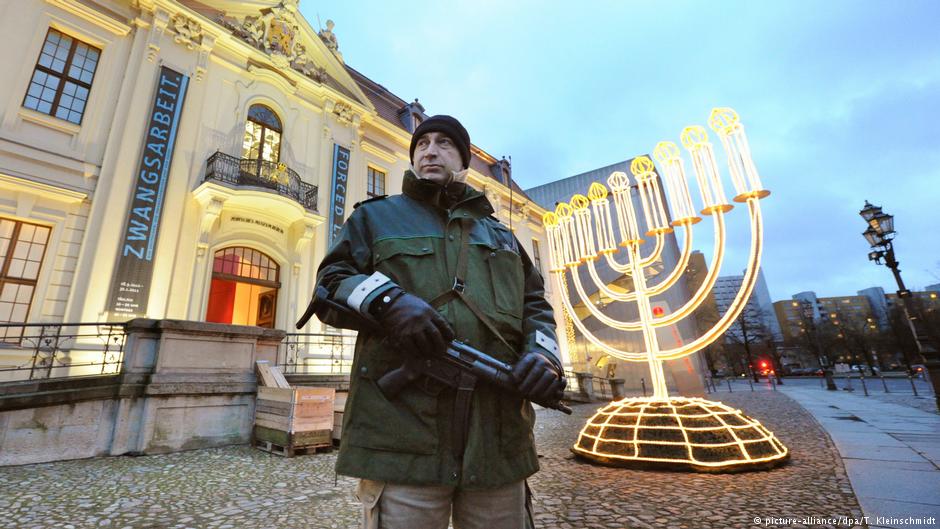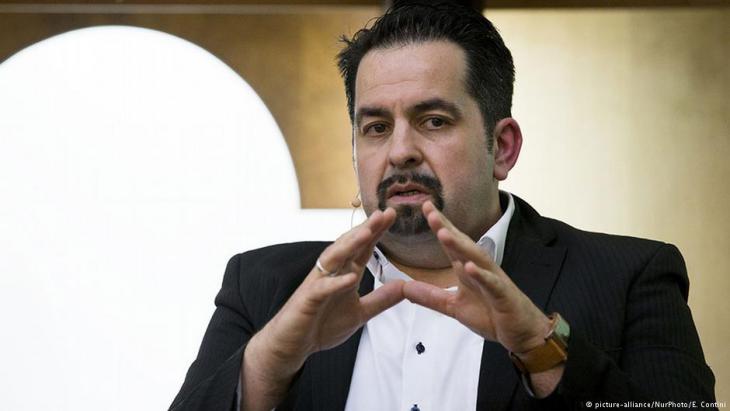Moving in the right direction

The burning of an Israeli flag during a demonstration in Berlin last December provoked indignation across all party lines. In response, the German Bundestag voted in January 2018 to appoint an anti-Semitism commissioner – a project that has been on the agenda for some time in view of the growing number of anti-Semitic incidents in the country.
A total of 16 measures are planned, including the sponsorship of dialogue projects between Jews and Muslims. The idea for the commissioner has however met with criticism. "I don't think this is the right action to take," says the Jewish intellectual and psychologist Rolf Verleger, pointing out that, according to the latest anti-Semitism report, hostility to Jews in Germany has actually been declining for several years.
"Not wanting Turks as neighbours, or Sinti and Roma, or even worse, asylum seekers as neighbours – these are the real social problems in our country." But above all, Verleger sees the measure as setting a dangerous precedent for "unequal treatment", because other minorities will feel that their own rights are being ignored.
By this in particular he means Muslims, who might very well conclude that they are not being sufficiently respected. The wiser option would be to appoint an anti-racism commissioner, says Verleger. Said Hassan, a German of Lebanese descent living in Cologne, agrees: "We Muslims have been quite heavily affected lately by hostility. When the state now takes on only the problem of anti-Semitism, one can't help but feel neglected as a Muslim."
Mosque attacks on the rise
While Germans tend not to have a problem with Italians, Jews or coloureds as neighbours, the social distance towards Eastern Europeans, Muslims and asylum-seekers, as well as Sinti and Roma has been growing, according to the latest anti-Semitism report, published in 2017. The number of attacks on Muslims in Germany rose substantially in the second quarter of last year, reported the federal government in its response to a brief parliamentary enquiry from the Linke, Germany′s left-wing party. And a recent press release issued by the Central Council of Muslims in Germany (ZMD) addressing shots fired at a mosque in Halle states that there are "assaults on mosques almost every week" in Germany.
The chairman of the Central Council of Muslims, Aiman Mazyek, notes that the council in general welcomes the appointment of an anti-Semitism commissioner. "All ideologies that are racist or display contempt for fellow human beings must be combatted." The issue is therefore not to claim that fighting one form of racism is more important than another. The fact is instead that openly expressed Islamophobia, particularly in the social media, is much more prevalent than the usually latent, but nonetheless shockingly high, level of animosity toward Jews.

In particular due to the need to investigate the National Socialist Underground (NSU), the Central Council of the Muslims has already called in the past for the appointment of an anti-racism commissioner. And the council still sees a real need for such a post today. However, this position should not replace an anti-Semitism commissioner, but rather constitute an additional measure. "Against the background of our history in Germany and the burden we bear, I find it appropriate to install an anti-Semitism delegate," says Mazyek.
An anti-racism commissioner would be wiser
What Germany needs now is to raise awareness in society that any form of contempt for others is wrong. The 45-year-old Said Hassan, who is active in party politics, warns: "if in these times of persistent Islamophobia we choose to focus instead on anti-Semitism, this could very well backfire." Citizens of the Muslim faith may then feel discriminated against and develop resentment against the Jews.
The majority of the anti-Semitic crimes in Germany are still perpetrated by far-right extremists. But it is also true that prejudice against Jews is more widespread among Muslims than the rest of the population. This can be attributed to the Middle East conflict. "A federal commissioner charged with combatting every form of racism would contribute more to social peace," in Hassan's opinion.
The far right: hatred of both Jews and Muslims
Is it even possible to compare anti-Semitism with Islamophobia? Certainly, there are differences, says Rolf Verleger. But the professor of psychology does not find a comparison so unreasonable: "studies that survey both anti-Semitism and Islamophobia reveal that the two forms of prejudice always occur together."
The Kempf study on anti-Semitism and hostility to Israel, for example, showed that human rights-oriented groups display scarcely any animosity towards Jews and Muslims, while in right-wing groups antipathy toward members of both faiths is equally strong.

"That is to say, both forms of resentment always occur together," concludes Verleger. The chairman of the Central Council of Muslims sees things in a more nuanced way: "I would be rather reluctant to make comparisons, because our country's history has been marked by anti-Semitism in a particularly egregious way and we therefore bear an exceptional degree of responsibility." Contempt, hatred and certain ideologies are however attitudes that are associated both with anti-Semitism as well as Islamophobia, says Aiman Mazyek.
To compare is not to equate
Vehement debates about whether anti-Semitism and Islamophobia should even be mentioned in the same breath are nothing new. In December 2008 the Berlin Research Centre on Anti-Semitism held a symposium led by the renowned historian Wolfgang Benz on the relationship between anti-Semitism and Islamophobia.
Benz concluded, among other things, that anti-Muslim sentiment is being generated "using stereotypes and constructs that are commonly deployed as instruments of anti-Semitism". A group of authors including Henryk M. Broder sharply censured the scholar for his statement. According to these critics, comparing anti-Semitism and Islamophobia means to overlook that, in contrast to Islamophobia, the hostility toward Jews once led in Auschwitz to crimes on a scale unknown in human history. They maintain that anti-Semitism is thus by its very nature a much more destructive attitude than for example simple prejudice against Muslims. Critics of the author group in turn argue that comparing anti-Semitism and Islamophobia does not mean equating them and by no means trivialises the Holocaust.
Ulrike Hummel
© Qantara.de 2018
Translated from the German by Jennifer Taylor
